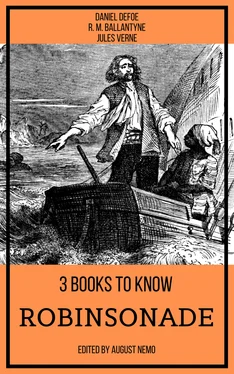“Now, then, Jack,” said he, “be cautious; steer clear o’ that seaweed. There! that’s it; gently, now — gently. I see a fellow at least a foot long down there coming to — Ha! that’s it! Oh bother! he’s off!”
“Did he bite?” said Jack, urging the log onwards a little with his paddle.
“Bite? Ay! he took it into his mouth, but the moment I began to haul he opened his jaws and let it out again.”
“Let him swallow it next time,” said Jack, laughing at the melancholy expression of Peterkin’s visage.
“There he’s again!” cried Peterkin, his eyes flashing with excitement. “Look out! Now, then! No! Yes! No! Why, the brute won’t swallow it!”
“Try to haul him up by the mouth, then!” cried Jack. “Do it gently.”
A heavy sigh and a look of blank despair showed that poor Peterkin had tried and failed again.
“Never mind, lad,” said Jack in a voice of sympathy; “we’ll move on and offer it to some other fish.” So saying, Jack plied his paddle; but scarcely had he moved from the spot when a fish with an enormous head and a little body darted from under a rock and swallowed the bait at once.
“Got him this time — that’s a fact!” cried Peterkin, hauling in the line. “He’s swallowed the bait right down to his tail, I declare! Oh, what a thumper!”
As the fish came struggling to the surface we leaned forward to see it, and overbalanced the log. Peterkin threw his arms round the fish’s neck, and in another instant we were all floundering in the water!
A shout of laughter burst from us as we rose to the surface, like three drowned rats, and seized hold of the log. We soon recovered our position, and sat more warily; while Peterkin secured the fish, which had well-nigh escaped in the midst of our struggles. It was little worth having, however. But, as Peterkin remarked, it was better than the smouts he had been catching for the last two or three days; so we laid it on the log before us, and having rebaited the line, dropped it in again for another.
Now, while we were thus intent upon our sport, our attention was suddenly attracted by a ripple on the sea, just a few yards away from us. Peterkin shouted to us to paddle in that direction, as he thought it was a big fish and we might have a chance of catching it. But Jack, instead of complying, said, in a deep, earnest tone of voice, which I never before heard him use, “Haul up your line, Peterkin; seize your paddle. Quick — it’s a shark!”
The horror with which we heard this may well be imagined; for it must be remembered that our legs were hanging down in the water, and we could not venture to pull them up without upsetting the log. Peterkin instantly hauled up the line, and grasping his paddle, exerted himself to the utmost, while we also did our best to make for shore. But we were a good way off, and the log being, as I have before said, very heavy, moved but slowly through the water. We now saw the shark quite distinctly swimming round and round us, its sharp fin every now and then protruding above the water. From its active and unsteady motions, Jack knew it was making up its mind to attack us; so he urged us vehemently to paddle for our lives, while he himself set us the example. Suddenly he shouted, “Look out! there he comes!” and in a second we saw the monstrous fish dive close under us and turn half-over on his side. But we all made a great commotion with our paddles, which, no doubt, frightened it away for that time, as we saw it immediately after circling round us as before.
“Throw the fish to him!” cried Jack in a quick, suppressed voice; “we’ll make the shore in time yet if we can keep him off for a few minutes.”
Peterkin stopped one instant to obey the command, and then plied his paddle again with all his might. No sooner had the fish fallen on the water than we observed the shark to sink. In another second we saw its white breast rising; for sharks always turn over on their sides when about to seize their prey, their mouths being not at the point of their heads like those of other fish, but, as it were, under their chins. In another moment his snout rose above the water; his wide jaws, armed with a terrific double row of teeth, appeared; the dead fish was engulfed, and the shark sank out of sight. But Jack was mistaken in supposing that it would be satisfied. In a very few minutes it returned to us, and its quick motions led us to fear that it would attack us at once.
“Stop paddling!” cried Jack suddenly. “I see it coming up behind us. Now, obey my orders quickly. Our lives may depend on it. Ralph — Peterkin — do your best to balance the log. Don’t look out for the shark. Don’t glance behind you. Do nothing but balance the log.”
Peterkin and I instantly did as we were ordered, being only too glad to do anything that afforded us a chance or a hope of escape, for we had implicit confidence in Jack’s courage and wisdom. For a few seconds, that seemed long minutes to my mind, we sat thus silently; but I could not resist glancing backward, despite the orders to the contrary. On doing so, I saw Jack sitting rigid like a statue, with his paddle raised, his lips compressed, and his eyebrows bent over his eyes, which glared savagely from beneath them down into the water.
I also saw the shark, to my horror, quite close under the log, in the act of darting towards Jack’s foot. I could scarce suppress a cry on beholding this. In another moment the shark rose. Jack drew his leg suddenly from the water and threw it over the log. The monster’s snout rubbed against the log as it passed, and revealed its hideous jaws, into which Jack instantly plunged the paddle and thrust it down its throat. So violent was this act that Jack rose to his feet in performing it; the log was thereby rolled completely over, and we were once more plunged into the water. We all rose, spluttering and gasping, in a moment.
“Now, then, strike out for shore!” cried Jack. —“Here, Peterkin, catch hold of my collar, and kick out with a will!”
Peterkin did as he was desired, and Jack struck out with such force that he cut through the water like a boat; while I, being free from all encumbrance, succeeded in keeping up with him. As we had by this time drawn pretty near to the shore, a few minutes more sufficed to carry us into shallow water; and finally, we landed in safety, though very much exhausted, and not a little frightened, by our terrible adventure.
THE BEAUTIES OF THE Bottom of the Sea Tempt Peterkin to Dive — How he Did it — More Difficulties Overcome — The Water Garden — Curious Creatures of the Sea — The Tank — Candles Missed Very Much, and the Candle-Nut Tree Discovered — Wonderful Account of Peterkin’s First Voyage — Cloth Found Growing on a Tree — A Plan Projected, and Arms Prepared for Offence and Defence — A Dreadful Cry.

OUR ENCOUNTER WITH the shark was the first great danger that had befallen us since landing on this island; and we felt very seriously affected by it, especially when we considered that we had so often unwittingly incurred the same danger before while bathing. We were now forced to take to fishing again in the shallow water until we should succeed in constructing a raft. What troubled us most, however, was that we were compelled to forego our morning swimming-excursions. We did, indeed, continue to enjoy our bathe in the shallow water; but Jack and I found that one great source of our enjoyment was gone when we could no longer dive down among the beautiful coral groves at the bottom of the lagoon. We had come to be so fond of this exercise, and to take such an interest in watching the formations of coral and the gambols of the many beautiful fish amongst the forest of red and green seaweeds, that we had become quite familiar with the appearance of the fish and the localities that they chiefly haunted. We had also become expert divers. But we made it a rule never to stay long under water at a time. Jack told me that to do so often was bad for the lungs, and instead of affording us enjoyment, would ere long do us a serious injury. So we never stayed at the bottom as long as we might have done, but came up frequently to the top for fresh air, and dived down again immediately. Sometimes, when Jack happened to be in a humorous frame, he would seat himself at the bottom of the sea on one of the brain-corals, as if he were seated on a large paddock-stool, and then make faces at me in order, if possible, to make me laugh under water. At first, when he took me unawares, he nearly succeeded, and I had to shoot to the surface in order to laugh; but afterwards I became aware of his intentions, and being naturally of a grave disposition, I had no difficulty in restraining myself. I used often to wonder how poor Peterkin would have liked to be with us; and he sometimes expressed much regret at being unable to join us. I used to do my best to gratify him, poor fellow, by relating all the wonders that we saw; but this, instead of satisfying, seemed only to whet his curiosity the more, so one day we prevailed on him to try to go down with us. But although a brave boy in every other way, Peterkin was very nervous in the water; and it was with difficulty we got him to consent to be taken down, for he could never have managed to push himself down to the bottom without assistance. But no sooner had we pulled him down a yard or so into the deep, clear water than he began to struggle and kick violently; so we were forced to let him go, when he rose out of the water like a cork, gave a loud gasp and a frightful roar, and struck out for the land with the utmost possible haste.
Читать дальше













